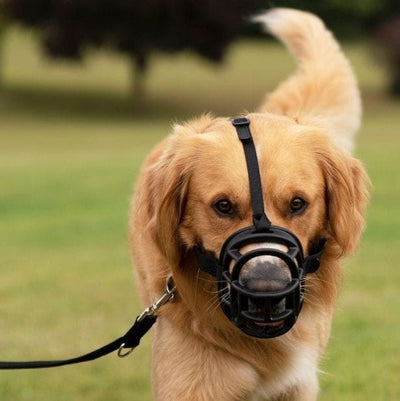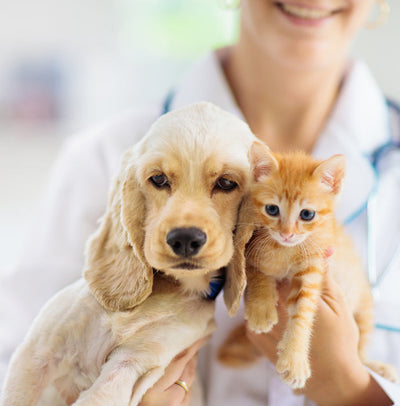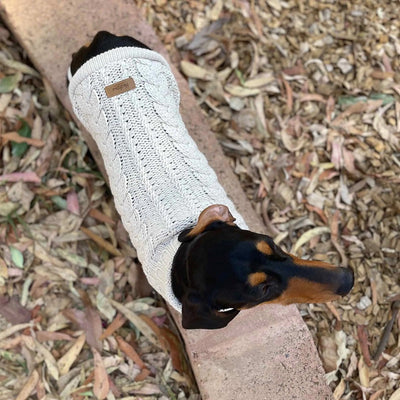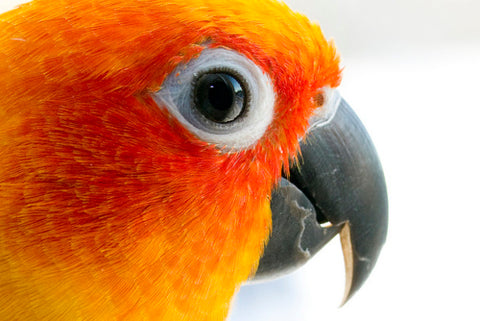
Sun Conures are undoubtedly one of the most popular pet parrots in Australia. With their vibrant and captivating appearance, it's no wonder they steal the hearts of pet lovers. Equipped with a stunning combination of vivid yellow, orange, and green feathers, these small-sized parrots arestunning.
But their attractiveness isn't the only reason why Sun Conures have gained such popularity. These intelligent and social birds also possess a playful and affectionate nature that appeals to many pet lovers. Their cheerful demeanor and ability to mimic sounds make them remarkable companions, bringing joy and entertainment to households across the country.
In addition to their entertaining qualities, Sun Conures are known for their sturdy and adaptable nature, making them suitable pets for both beginners and experienced bird owners. They thrive in a stimulating and interactive environment, flourishing with plenty of toys, social interaction, and mental stimulation.
Sun Conures are a top choice that promises to bring colour, charm, and endless entertainment into your life if you are looking for a new pet.
Characteristics and Appearance of Sun Conures
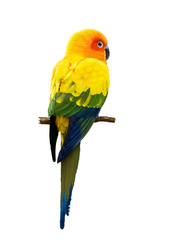 Sun Conures are known for their vibrant and plumage. They have a small to medium-sized body, reaching an average length of 30cm. Their most distinctive feature is their plumage, which is a beautiful combination of bright yellow, orange, and green feathers. The head and face are adorned with a splash of blue near the eyes and a reddish-orange patch on the forehead.
Sun Conures are known for their vibrant and plumage. They have a small to medium-sized body, reaching an average length of 30cm. Their most distinctive feature is their plumage, which is a beautiful combination of bright yellow, orange, and green feathers. The head and face are adorned with a splash of blue near the eyes and a reddish-orange patch on the forehead.
These parrots have a long, slender tail with blue feathers at the base, gradually transitioning to green towards the tip. Their beak is black and curved, perfect for cracking open seeds and nuts. The eyes are dark and expressive, adding to their overall charm.
Natural Habitat and Distribution of Sun Conures
Sun Conures are native to the northeastern coastal forests of South America, specifically Brazil, Guyana, and Suriname. They thrive in tropical rainforests and woodland areas, where they can find an abundance of fruits, seeds, and nuts.
In their natural habitat, Sun Conures are highly social birds, often seen in flocks of 20 or more individuals. They are diurnal creatures, meaning they are active during the day, spending their time flying, foraging, and socialising with their flock mates.
Why Sun Conures are Popular in Australia
 While there are more than 40 different varieties of Conures, Sun Conures have become immensely popular in Australia for several reasons. Here at We Know Pets, our experience with these parrots makes it clear to us why they make great pets! Initially, their stunning appearance and bright colours make them incredibly attractive to bird enthusiasts and pet owners. Fun fact, Sun Conures are 'sexually monomorphic species’, meaning you can't tell a male apart from a female from appearance.
While there are more than 40 different varieties of Conures, Sun Conures have become immensely popular in Australia for several reasons. Here at We Know Pets, our experience with these parrots makes it clear to us why they make great pets! Initially, their stunning appearance and bright colours make them incredibly attractive to bird enthusiasts and pet owners. Fun fact, Sun Conures are 'sexually monomorphic species’, meaning you can't tell a male apart from a female from appearance.
Secondly, Sun Conures have a cheeky personality that appeals to many individuals. They are known for their affectionate nature and their ability to form strong bonds with their owners. These parrots thrive on social interaction and enjoy being the center of attention, making them delightful companions.
Furthermore, Sun Conures are highly intelligent and can be trained to do tricks and mimic sounds. Their natural curiosity and eagerness to learn make them excellent candidates for training and mental stimulation. This aspect adds an extra layer of entertainment value to owning a Sun Conure, as they can provide endless hours of joy and amusement.
Lastly, Sun Conures are relatively easy to care for and adapt well to domestic environments. They are sturdy birds that can withstand the fluctuations in temperature commonly experienced in Australia. This adaptability, combined with their low maintenance requirements, makes them a popular choice among both beginner and experienced bird owners.
Caring for Sun Conures as Pets
Owning a Sun Conure requires a commitment to providing proper care and attention. Here are some essential aspects to consider when caring for these vibrant parrots:
Diet and Nutrition for Sun Conures
A balanced and nutritious diet is crucial for the overall health and well-being of Sun Conures. Their diet should primarily consist of high-quality commercial pellets specifically formulated for parrots. These pellets provide the necessary vitamins, minerals, and nutrients that Sun Conures need to thrive.
Alongside pellets, Sun Conures should also be offered a variety of fresh fruits and vegetables. Some suitable options include apples, bananas, oranges, leafy greens, carrots, and bell peppers. It's important to introduce new foods gradually and monitor their response to ensure they are not experiencing any digestive issues.
Additionally, Sun Conures enjoy the occasional treat, such as unsalted nuts or seeds. However, treats should be given sparingly to avoid weight gain or nutritional imbalances.
Housing and Enrichment for Sun Conures
Sun Conures require a spacious and secure cage that allows them to stretch their wings and move around comfortably. The cage should be equipped with perches of  varying thickness to promote foot health, as well as toys and interactive accessories to keep them mentally stimulated.
varying thickness to promote foot health, as well as toys and interactive accessories to keep them mentally stimulated.
Toys that encourage foraging and chewing are particularly beneficial for Sun Conures, as they help satisfy their natural instincts. This can include puzzle toys, shreddable toys, and toys made from safe and non-toxic materials. Regularly rotating and introducing new toys will keep them engaged and prevent boredom.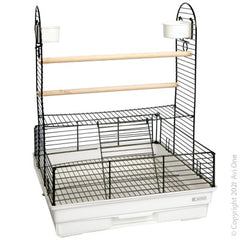
It's important to provide ample out-of-cage time for Sun Conures to exercise and explore their environment. Supervised playtime outside the cage allows them to spread their wings, interact with their human companions, and experience new sights and sounds.
Diet
 A well-balanced diet is crucial for the health and well-being of Sun Conures. These birds require a combination of high-quality pellets, fresh fruits, and vegetables. We recommend South American pellets with fruit and vegetables. It's important to provide a variety of foods to ensure they receive all the necessary nutrients. Additionally, fresh water should always be available.
A well-balanced diet is crucial for the health and well-being of Sun Conures. These birds require a combination of high-quality pellets, fresh fruits, and vegetables. We recommend South American pellets with fruit and vegetables. It's important to provide a variety of foods to ensure they receive all the necessary nutrients. Additionally, fresh water should always be available.
Housing
Sun Conures are active birds that require ample space to move around and exercise. A spacious cage with plenty of perches and toys is essential for their physical and mental stimulation. The cage should be cleaned regularly to maintain hygiene and prevent the buildup of waste.
Socialisation
Sun Conures thrive on social interaction and should not be left alone for extended periods. They enjoy spending time with their human companions and can become lonely or bored if left in isolation. Regular out-of-cage time, play sessions, and interaction with their owners are essential for their overall well-being. For more information about training a pet parrot, read our previous article: A Step-by-Step Approach on How to Train your Pet Bird
Mental Stimulation
These intelligent birds require mental stimulation to prevent boredom and ensure their happiness. Providing a variety of toys, puzzles, and foraging opportunities can keep them mentally engaged and prevent behavioral issues that may arise from boredom.
Exercise
Sun Conures are active birds and need regular exercise to maintain their physical health. They should be given ample time outside of their cage to stretch their wings and explore their surroundings. However, it's crucial to ensure their safety and supervise them during their out-of-cage time.
Health and Common Diseases of Sun Conures
Like any pet, Sun Conures are susceptible to certain health issues. Understanding the common diseases and ailments that affect them can help ensure their well-being and prompt intervention if necessary.
One common health problem among Sun Conures is feather plucking. This behaviour can be caused by various factors, including boredom, stress, or a medical issue. It's essential to identify the underlying cause and address it accordingly, whether it's providing more mental stimulation or seeking veterinary advice.
Respiratory infections, such as sinusitis or pneumonia, can also occur in Sun Conures. These infections are often caused by exposure to drafts or poor air quality. Maintaining a clean and well-ventilated environment, along with regular veterinary check-ups, can help prevent and detect respiratory issues early on.
Additionally, Sun Conures are prone to nutritional deficiencies if their diet is not well-balanced. Calcium and vitamin A are key to preventing respiratory infections.
Is a Sun Conure the Right Parrot for You?
While Sun Conures are undoubtedly captivating and entertaining pets, they may not be suitable for everyone. It's important to consider the factors above before deciding to bring a Sun Conure into your life. For further information, please contact our knowledgeable staff who will be able to answer your questions.
© weknowpets 2024


